Fire Read online
Table of Contents
Title Page
Copyright Page
Dedication
PART ONE - Monsters
CHAPTER ONE
CHAPTER TWO
CHAPTER THREE
CHAPTER FOUR
CHAPTER FIVE
CHAPTER SIX
CHAPTER SEVEN
CHAPTER EIGHT
CHAPTER NINE
CHAPTER TEN
CHAPTER ELEVEN
CHAPTER TWELVE
CHAPTER THIRTEEN
CHAPTER FOURTEEN
CHAPTER FIFTEEN
CHAPTER SIXTEEN
PART TWO - Spies
CHAPTER SEVENTEEN
CHAPTER EIGHTEEN
CHAPTER NINETEEN
CHAPTER TWENTY
CHAPTER TWENTY-ONE
CHAPTER TWENTY-TWO
CHAPTER TWENTY-THREE
CHAPTER TWENTY-FOUR
CHAPTER TWENTY-FIVE
PART THREE - A Graceling
CHAPTER TWENTY-SIX
CHAPTER TWENTY-SEVEN
CHAPTER TWENTY-EIGHT
CHAPTER TWENTY-NINE
CHAPTER THIRTY
CHAPTER THIRTY-ONE
PART FOUR - The Dells
CHAPTER THIRTY-TWO
EPILOGUE
Acknowledgements
DIAL BOOKS
An imprint of Penguin Group (USA) Inc. • Published by The Penguin Group
Penguin Group (USA) Inc., 375 Hudson Street, New York, NY 10014, U.S.A.
Penguin Group (Canada), 90 Eglinton Avenue East, Suite 700, Toronto, Ontario, Canada M4P
2Y3 (a division of Pearson Penguin Canada Inc.) • Penguin Books Ltd, 80 Strand, London
WC2R 0RL, England • Penguin Ireland, 25 St. Stephen’s Green, Dublin 2, Ireland (a division of
Penguin Books Ltd) • Penguin Group (Australia), 250 Camberwell Road, Camberwell, Victoria
3124, Australia (a division of Pearson Australia Group Pty Ltd) • Penguin Books India Pvt Ltd,
11 Community Centre, Panchsheel Park, New Delhi - 110 017, India • Penguin Group (NZ), 67
Apollo Drive, Rosedale, North Shore 0632, New Zealand (a division of Pearson New Zealand Ltd)
Penguin Books (South Africa) (Pty) Ltd, 24 Sturdee Avenue, Rosebank, Johannesburg 2196,
South Africa • Penguin Books Ltd, Registered Offices: 80 Strand, London WC2R 0RL, England
Copyright © 2009 by Kristin Cashore • Map by Jeffery C. Mathison
All rights reserved
The publisher does not have any control over and does not assume any
responsibility for author or third-party websites or their content.
Library of Congress Cataloging-in-Publication Data
Cashore, Kristin.
Fire / Kristin Cashore.
p. cm.
“Map by Jeffery C. Mathison”—Verso t.p.
Summary: In a kingdom called the Dells, Fire is the last human-shaped monster,
with unimaginable beauty and the ability to control the minds of those around her,
but even with these gifts she cannot escape the strife that overcomes her world.
eISBN : 978-1-101-15580-6
[1. Fantasy.] I. Title.
PZ7.C26823Fi 2009
[Fic]—dc22
2009005187
http://us.penguingroup.com
For my little sister Catherine,
the (Corinthian) pillar
of my heart
DELLIAN LAMENT
While I was looking the other way your fire went out
Left me with cinders to kick into dust
What a waste of the wonder you were
In my living fire I will keep your scorn and mine
In my living fire I will keep your heartache and mine
At the disgrace of a waste of a life
PROLOGUE
LARCH OFTEN THOUGHT that if it had not been for his newborn son, he never would have survived his wife Mikra’s death. It was half that the infant boy needed a breathing, functioning father who got out of bed in the mornings and slogged through the day; and it was half the child himself. Such a good-natured baby, so calm. His gurgles and coos so musical, and his eyes deep brown like the eyes of his dead mother.
Larch was a game warden on the riverside estate of a minor lord in the southeastern kingdom of Monsea. When Larch returned to his quarters after a day in the saddle, he took the baby from the arms of the nursemaid almost jealously. Dirty, stinking of sweat and horses, he cradled the boy against his chest, sat in his wife’s old rocker, and closed his eyes. Sometimes he cried, tears painting clean stripes down a grimy face, but always quietly, so that he would not miss the sounds the child made. The baby watched him. The baby’s eyes soothed him. The nursemaid said it was unusual for a baby so young to have such focused eyes. “It’s not something to be happy about,” she warned, “a child with strange eyes.”
Larch couldn’t find it within himself to worry. The nursemaid worried enough for two. Every morning she examined the baby’s eyes, as was the unspoken custom of all new parents in the seven kingdoms, and every morning she breathed more easily once she’d confirmed that nothing had changed. For the infant who fell asleep with both eyes the same color and woke with eyes of two different colors was a Graceling; and in Monsea, as in most of the kingdoms, Graceling babies immediately became the property of the king. Their families rarely saw them again.
When the first anniversary of the birth of Larch’s son had come and gone with no change to the boy’s brown eyes, the nursemaid still did not leave off her muttering. She’d heard tales of Graceling eyes that took more than a year to settle, and Graceling or not, the child was not normal. A year out of his mother’s womb and already Immiker could say his own name. He spoke in simple sentences at fifteen months; he left his babyish pronunciation behind at a year and a half. At the beginning of her time with Larch, the nursemaid had hoped her care would gain her a husband and a strong, healthy son. Now she found the baby who conversed like a miniature adult while he drank at her breast, who made an eloquent announcement whenever his underwrappings needed to be changed, positively creepy. She resigned her post.
Larch was happy to see the sour woman go. He constructed a carrier so that the child could hang against his chest while he worked. He refused to ride on cold or rainy days; he refused to gallop his horse. He worked shorter hours and took breaks to feed Immiker, nap him, clean his messes. The baby chattered constantly, asked for the names of plants and animals, made up nonsense poems that Larch strained to hear, for the poems always made Larch laugh.
“Birdies love treetops to whirl themselves through, for inside of their heads they are birds,” the boy sang absentmindedly, patting his hand on his father’s arm. Then, a minute later: “Father?”
“Yes, son?”
“You love the things that I love you to do, for inside of your head are my words.”
Larch was utterly happy. He couldn’t remember why his wife’s death had saddened him so. He saw now that it was better this way, he and the boy alone in the world. He began to avoid the people of the estate, for their tiresome company bored him, and he didn’t see why they should deserve to share in the delight of his son’s company.
One morning when Immiker was three years old Larch opened his eyes to find his son lying awake beside him, staring at him. The boy’s right eye was gray. His left eye was red. Larch shot up, terrified and heartbroken. “They’ll take you,” he said to his son. “They’ll take you away from me.”
Immiker blinked calmly. “They won’t, because you’ll come up with a plan to stop them.”
To withhold a Graceling from the king was royal theft, punishable by imprisonment and fines Larch could never pay, but still Larch was seized by a compulsion to do what the boy
said. They would have to ride east, into the rocky border mountains where hardly anyone lived, and find a patch of stone or scrub that could serve as a hiding place. As a game warden, Larch could track, hunt, build fires, and make a home for Immiker that no one would find.
IMMIKER WAS REMARKABLY calm about their flight. He knew what a Graceling was. Larch supposed the nursemaid had told him; or perhaps Larch himself had explained it and then forgotten he’d done so. Larch was growing forgetful. He sensed parts of his memory closing up on him, like dark rooms behind doors he could no longer open. Larch attributed it to his age, for neither he nor his wife had been young when she’d died birthing their son.
“I’ve wondered sometimes if your Grace has anything to do with speaking,” Larch said as they rode the hills east, leaving the river and their old home behind.
“It doesn’t,” Immiker said.
“Of course it doesn’t,” Larch said, unable to fathom why he’d ever thought it did. “That’s all right, son, you’re young yet. We’ll watch out for it. We’ll hope it’s something useful.”
Immiker didn’t respond. Larch checked the straps that held the boy before him in the saddle. He bent down to kiss the top of Immiker’s golden head, and urged the horse onward.
A GRACE WAS a particular skill far surpassing the capability of a normal human being. A Grace could take any form. Most of the kings had at least one Graceling in his kitchens, a superhumanly capable bread baker or winemaker. The luckiest kings had soldiers in their armies Graced with sword fighting. A Graceling might have impossibly good hearing, run as fast as a mountain lion, calculate large sums mentally, even sense if food was poisoned. There were useless Graces, too, like the ability to twist all the way around at the waist or eat rocks without sickening. And there were eerie Graces. Some Gracelings saw events before they happened. Some could enter the minds of others and see things it was not their business to see. The Nanderan king was said to own a Graceling who could tell if a person had ever committed a crime, just by looking into his face.
The Gracelings were tools of the kings, and no more. They were not thought to be natural, and people who could avoid them did, in Monsea and in most of the other six kingdoms as well. No one wished the company of a Graceling.
Larch had once shared this attitude. Now he saw that it was cruel, unjust, and ignorant, for his son was a normal little boy who happened to be superior in many ways, not just in the way of his Grace, whatever it might turn out to be. It was all the more reason for Larch to remove his son from society. He would not send Immiker to the king’s court, to be shunned and teased, and put to whatever use pleased the king.
THEY WERE NOT long in the mountains before Larch accepted, bitterly, that it was an impossible hiding place. It wasn’t the cold that was the problem, though autumn here was as raw as midwinter had been on the lord’s estate. It wasn’t the terrain either, though the scrub was hard and sharp, and they slept on rock every night, and there was no place even to imagine growing vegetables or grain. It was the predators. Not a week went by that Larch didn’t have to defend against some attack. Mountain lions, bears, wolves. The enormous birds, the raptors, with a wingspan twice the height of a man. Some of the creatures were territorial, all of them were vicious, and as winter closed in bleakly around Larch and Immiker, all of them were starving. Their horse was lost one day to a pair of mountain lions.
At night, inside the thorny shelter Larch had built of sticks and scrub, he would pull the boy into the warmth of his coat and listen for the howls, the tumbled stones down the slope, the screeches, that meant an animal had scented them. At the first telltale sound he would strap the sleeping boy into the carrier on his chest. He would light as powerful a torch as he had the fuel for, go out of the shelter, and stand there, holding off the attack with fire and sword. Sometimes he stood there for hours. Larch didn’t get a lot of sleep.
He wasn’t eating much either.
“You’ll make yourself sick if you keep eating so much,” Immiker said to Larch over their paltry dinner of stringy wolf meat and water.
Larch stopped chewing immediately, for sickness would make it harder to defend the boy. He handed over the majority of his portion. “Thank you for the warning, son.”
They ate quietly for a while, Immiker devouring Larch’s food. “What if we went higher into the mountains and crossed to the other side?” Immiker asked.
Larch looked into the boy’s mismatched eyes. “Is that what you think we should do?”
Immiker shrugged his small shoulders. “Could we survive the crossing?”
“Do you think we could?” Larch asked, and then shook himself as he heard his own question. The child was three years old and knew nothing of crossing mountains. It was a sign of Larch’s fatigue, that he groped so desperately and so often for his son’s opinion.
“We would not survive,” Larch said firmly. “I’ve heard of no one who has ever made it across the mountains to the east, either here or in Estill or Nander. I know nothing of the land beyond the seven kingdoms, except for tall tales the eastern people tell about rainbow-colored monsters and underground labyrinths.”
“Then you’ll have to bring me back down into the hills, Father, and hide me. You must protect me.”
Larch’s mind was foggy, tired, starved, and shot through with one lightning bolt of clarity, which was his determination to do what Immiker said.
SNOW WAS FALLING as Larch picked his way down a sheer slope. The boy was strapped inside his coat. Larch’s sword, his bow and arrows, some blankets, and bundled scraps of meat hung on his back. When the great brown raptor appeared over a distant ridge, Larch reached for his bow tiredly. But the bird lunged so fast that all in an instant it was too close to shoot. Larch stumbled away from the creature, fell, and felt himself sliding downward. He braced his arms before him to shield the child, whose screams rose above the screams of the bird: “Protect me, Father! You must protect me, Father!”
Suddenly the slope under Larch’s back gave way and they were falling through darkness. An avalanche, Larch thought numbly, every nerve in his body still focused on protecting the child under his coat. His shoulder hit something sharp and Larch felt tearing flesh, and wetness, warmth. Strange, to be plunging downward like this. The drop was heady, dizzying, as if it were vertical, a free fall; and just before he slipped into unconsciousness Larch wondered if they were falling through the mountain to the floor of the earth.
LARCH JACKKNIFED AWAKE, frantic with one thought: Immiker. The boy’s body wasn’t touching his, and the straps hung from his chest, empty. Larch felt around with his hands, whimpering. It was dark. The surface on which he lay was hard and slick, like slimy ice. He shifted to extend his reach and screamed suddenly, incoherently, at the pain that ripped through his shoulder and head. Nausea surged in his throat. He fought it down and lay still again, weeping helplessly and moaning the boy’s name.
“All right, Father,” Immiker’s voice said, very close beside him. “Stop crying and get up.”
Larch’s weeping turned to sobs of relief.
“Get up, Father. I’ve explored. There’s a tunnel and we must go.”
“Are you hurt?”
“I’m cold and hungry. Get up.”
Larch tried to lift his head, and cried out, almost blacked out. “It’s no use. The pain is too great.”
“The pain is not so great that you can’t get up,” Immiker said, and when Larch tried again he found that the boy was right. It was excruciating, and he vomited once or twice, but it was not so bad that he couldn’t prop himself on his knees and his uninjured arm, and crawl across the icy surface behind his son.
“Where,” he gasped, and then abandoned his question. It was too much work.
“We fell through a crack in the mountain,” Immiker said. “We slid. There’s a tunnel.”
Larch didn’t understand, and forward progress took so much concentration that he stopped trying to. The way was slippery and downhill. The place they went toward was s
lightly darker than the place they came from. His son’s small form scuttled down the slope ahead of him.
“There’s a drop,” Immiker said, but comprehension came so slowly to Larch that before he understood, he fell, tumbling knees over neck off a short ledge. He landed on his injured shoulder and momentarily lost consciousness. He woke to a cold breeze and a musty smell that hurt his head. He was in a narrow space, crammed between close walls. He tried to ask whether his fall had injured the boy, but only managed a moan.
“Which way?” Immiker’s voice asked.
Larch didn’t know what he meant, and moaned again.
Immiker’s voice was tired, and impatient. “I’ve told you, it’s a tunnel. I’ve felt along the wall in both directions. Choose which way, Father. Take me out of this place.”
The ways were identically dim, identically musty, but Larch needed to choose, if it was what the boy thought best. He shifted himself carefully. His head hurt less when he faced the breeze than when he turned his back to it. This decided him. They would walk toward the source of the breeze.
And that is why, after four days of bleeding, stumbling, and starving, after four days of Immiker reminding him repeatedly that he was well enough to keep walking, Larch and Immiker stepped out of the tunnel not into the light of the Monsean foothills, but into that of a strange land on the other side of the Monsean peaks. An eastern land neither of them had heard of except for foolish tales told over Monsean dinners—tales of rainbow-colored monsters and underground labyrinths.
LARCH WONDERED SOMETIMES if a blow to his head on the day he’d fallen through the mountain had caused some hurt to his brain. The more time he spent in this new land, the more he struggled against a fog hovering on the edge of his mind. The people here spoke differently and Larch struggled with the strange words, the strange sounds. He depended on Immiker to translate. As time passed he depended on Immiker to explain a great many things.

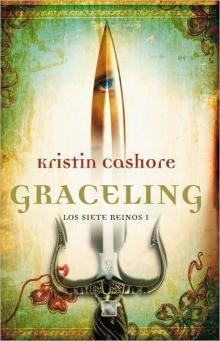 Graceling
Graceling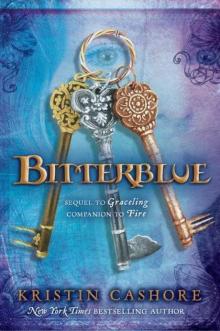 Bitterblue
Bitterblue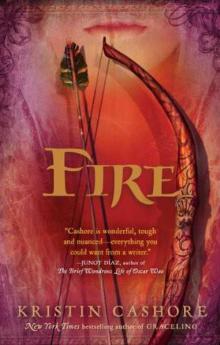 Fire
Fire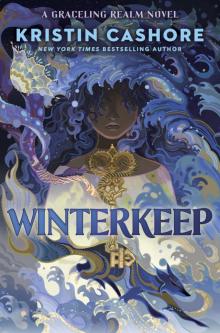 Winterkeep
Winterkeep Helen Keller in Love
Helen Keller in Love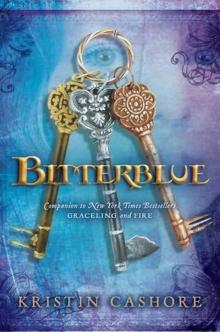 Bitterblue skt-3
Bitterblue skt-3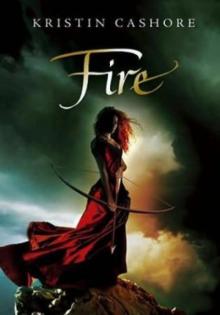 Fire skt-2
Fire skt-2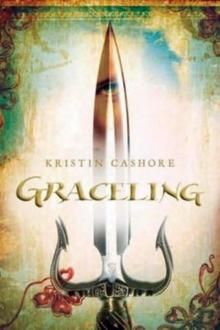 Graceling skt-1
Graceling skt-1